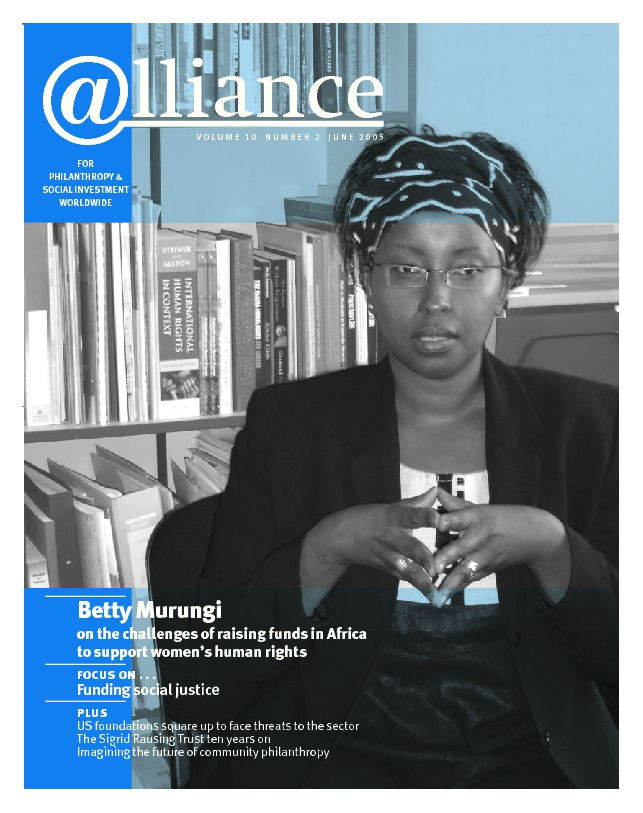Grantmaking foundations in Europe remain rather unknown territory when compared with their counterparts in the US. Whether measured by the quantity of political scrutiny and debate, numbers of researchers, commentators and institutes exploring aspects of foundations, column inches in academic or other journals, US foundations are largely out of the closet, European still largely inside. Quantity of scrutiny should not be confused with quality. None the less, the best of it ensures foundations become a little less elusive and, most importantly, challenges complacency.
Luc Tayart de Borms’s contribution to redressing some of the imbalance comes with a big title – Foundations – Creating Impact in a Globalised World. But the author is keen to express modesty: he wants to spark a discussion and his ideas are work in progress. As Managing Director of Belgium’s King Baudouin Foundation for over 20 years, he comes with a practitioner’s perspective. This can be a valuable asset in trying to move forward any debate about foundations’ place in the world, since it encourages empathy from fellow practitioners struggling to do likewise. His book is also welcome because it tackles the question of what foundations are for. Too often discussion of grantmaking foundations is preoccupied with process; too often making a grant is treated as the end rather than the means. He also punctures the silence on key issues such as payout rates – why is this subject not on the radar screen of every foundation?
The central theme of the book is that foundations need to reach well beyond traditional arm’s length grantmaking. They need to be engaged members of civil society, thinking and acting more strategically, agile in using a range of tools and non-grant activities to achieve their goals and become ‘impact-driven foundations’. Out of this can come not only social change but a strengthening of foundations’ legitimacy, something of evident concern to the author. There are parallels with the work of Diana Leat and Helmut Anheier, who have called for ‘creative foundations’ that exploit their freedom from political direction and dependence on the marketplace and contribute constructively to the problem-solving capacity of society.
How to bring this about? Early in his book, Tayart puts forward the concept of the foundation as ‘convenor’, presenting a ‘neutral platform’ for informed debate and discussion. But convening is only a means to an end, one tool in the kitbag. Later he seems to shift his ground: ‘foundations must identify – and exercise – the leverage points of change, one of which is to move off their traditionally neutral territory into a space where they can engage in a frank dialogue with their stakeholders … posing often tough questions and challenging the status quo.’
Understanding the policy environment is a prerequisite to being able to work effectively with it. For a UK European (as I count myself), Tayart’s summary of the differing characteristics of civil society in the countries of mainland Europe – from respect for independence to a desire to control – is a reminder that the institutional architecture is by no means uniform. This will affect foundations and shape the spaces for them to build and service civil society. Can and should foundations be direct agents of change? Should they move from the behind the scenes role of a non-engaged funder to writing the script, directing the action and appearing in the play? What are the implications of these different models?
In the UK, the richness and variety of the voluntary and community sector, running into hundreds of thousands of organizations across the spectrum of social issues, means that many foundations will choose to work with and through them. But there is a discernible shift among some foundations towards a more strategic and engaged approach in working with stakeholders. This might be because an issue demands fresh energy – as in the case of my own foundation’s Rethinking Crime and Punishment programme to reinvigorate debate on alternatives to imprisonment or Carnegie UK’s Third Age programme of the 1990s. Or because of wider shifts creating new spaces for foundations – for example the possibility that the voluntary and community sector becomes too focused on service provision, creating a growing vacuum in advocacy and campaigning.
Luc Tayart uses plenty of concrete examples to illustrate his themes, many from his own foundation. His text is at times repetitious and in need of some firmer editing, but he has done us a service in presenting ideas which get us to think afresh about what foundations are for and how we deliver. Let’s carry on the debate.
Margaret Hyde is Director of the Esmee Fairbairn Foundation, UK. She can be contacted at Margaret.Hyde@esmeefairbairn.org.uk
Foundations – Creating Impact in a Globalised World
Luc Tayart de Borms John Wiley £45/ €67.50/$90
ISBN 0470015055
To order visit http://www.wiley.com



Comments (0)